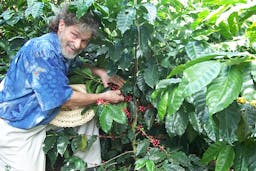Three Decades of Promoting Women's Empowerment in the Coffeelands (My Personal Statement)
Jan 21, 2015
First story
Three Decades of Promoting Women’s Empowerment
In the Coffeelands
Statement by Dean Cycon, Founder and CEO
Dean’s Beans Organic Coffee Company, USA
(Dedicated to the Memory of My Good Friend, Ingrid Washinawatok)
delivered at the UNIFEM Conference on Women's Empowerment Principles, March 9, 2011
I learned two important lessons as an advocate and activist with indigenous peoples in the late 1970’s and early 1980’s. First, without a strong economic base, native communities would disintegrate as their young people left for better opportunity and the lands were sold off piecemeal. Second, that women were a key to holding communities together, yet were usually ignored in the formal decision making processes of development by the outside organizations that came to aid communities in their struggles. And, all too often, they were marginalized within their own communities despite the important roles they played both in the family and in the economic life of the community.
It quickly became apparent that these two lessons were deeply intertwined, and that true progressive development required full and effective participation by women at all levels of the socio-economies of these communities. Thus, when we started Coffee Kids (the first international development organization in the coffee world) in 1988 and when Dean’s Beans began its formal program of People-Centered Development in 1993, women’s equality was a cornerstone to our approach. It remains that way today.
All of our inquiries into the issues affecting the coffee communities we work with throughout Asia, Africa and the Americas begin with formal and informal meetings with women’s groups, along with coop managers and other civic organizations (where they exist). We have learned over the years a method and style of inquiry that elicits from the women the deep dynamics of gender inequality within their communities. We co-design programs with both the women and the coop leaders to effectively address those dynamics. One time I sat with a women’s development committee at a coop in Guatemala, along with two female reporters from the progressive national media. The reporters asked very direct questions about the women’s lives, yet no one would respond. In the uncomfortable silence I asked if I could ask a question, and the group said yes. I asked “how would you like your daughters’ lives to be different from your own?” A flood of deep personal comments came out. From there we moved to what types of changes would be needed in their economic and social lives in order to realize their dreams for their daughters.
From conversations like these, programs emerge. All of the coops we work with are formally committed to gender equity. This means that there must be fair representation by women on the Board of Directors and the management committees. Much progress has been made in this, as four of the fourteen coops we work with around the world are now managed by women, and we offer financial and technical support to those women to train the next generation of women leaders. In this way, coops offer an oasis of opportunity for women within societies where their voice may not often be heard. Women are often the force behind our education, health and economic initiatives in the coffeelands.
In Ethiopia, education was second only to clean water as the highest developmental priority. We have school building programs in several communities, which include funds for the community to choose and pay for their own teachers (rural primary school teachers in Ethiopia are supplied by government, earn under $200 per year and are often sadly lacking in education themselves).
In Guatemala, we pioneered the marriage of revolving microloans and health care training for indigenous women, resulting in the world’s first self-funding women’s health promotion project. The project included literacy and accounting training. Most significantly, the women ran the program themselves rather than being the often passive participants in a project run by an outside organization. These women also identified the lack of self-esteem and opportunity for their daughters as a major roadblock to development. In response we co-founded CHICA, an indigenous teen girl peer-to-peer project (no adults allowed!) that has returned the first forty CHICA’s to school with greatly enhanced self-esteem and hope.
In Rwanda, the women identified gender violence as one of the biggest obstacles to community development. We created a program with a local men’s organization and a leading men overcoming gender violence group in the USA that facilitated the men and women identifying overt and subtle gender violence in their lives. The group then developed an on-going program where these farmers go to other coops in Rwanda and share their experience and skills to assist other communities to overcome gender violence.
In Peru, we established a women’s loan program with our partner, Pangoa Cooperative, which allows women access to credit and savings for the first time in their lives. Women have used the loans to pay for college for their children (the first in Pangoa’s history) and create many small- scale, successful businesses. Based on the success of CHICA, we are starting a new project in Peru with girls rescued from the sex trade, combining self-esteem building, economic opportunity and fostering with coffee families to break the cycle of dependency and fear.
While we have had much success promoting gender equality in the communities we partner with around the world, there remain so many deeply embedded social, cultural and legal impediments to full equality. I would be arrogant and insincere to ignore these powerful, on-going dynamics. To me, women’s empowerment is a life-long process that will always inform our work. I can find comfort in knowing that thousands of organizations large and small around the world are adding their light to this profound and critical movement. Women’s equality is serious business.




